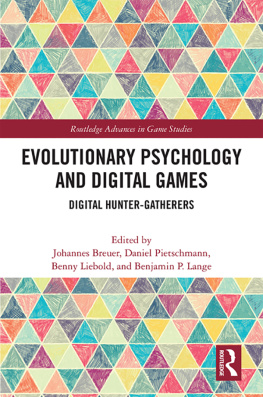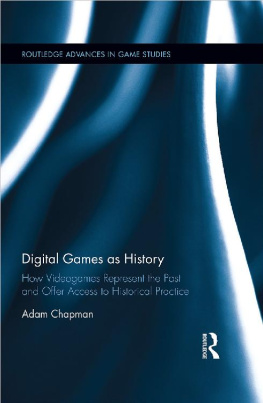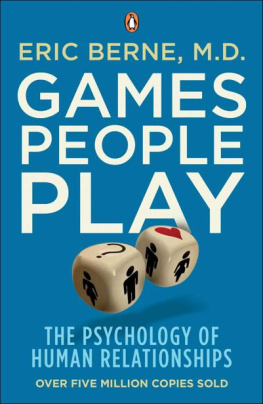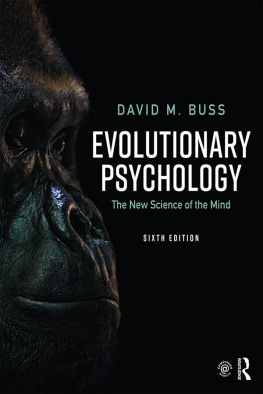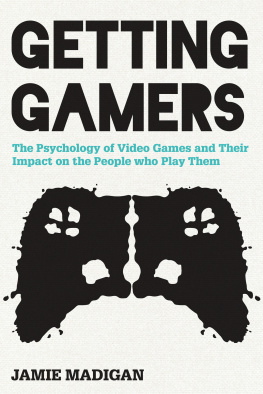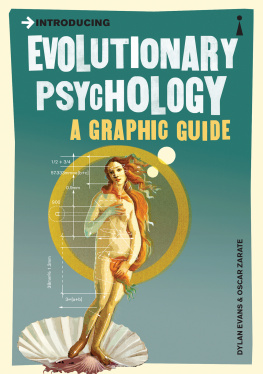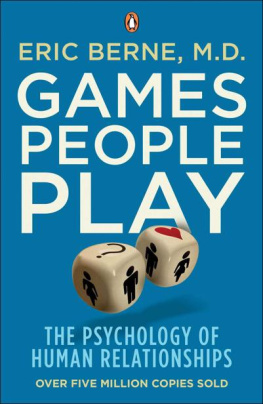Evolutionary Psychology and Digital Games
A fact-filled and vitally important book, in which top scholars successfully employ evolutionary theory to better understand the causes and effects of digital games.
Patrick Markey, Villanova University, USA
An evolutionary psychology approach is critical to understanding the implicit processes that explain both, why we play and how we make sense of play. Play is as natural to humanity as evolution, and implicating these natural processes into models of player psychology stands to deepen our ability to make claims about the experience of video game play.
Nicholas D. Bowman, West Virginia University
An important book that dares to dig deeper. Evolutionary psychology helps us uncover the underlying logics of why people play, and why digital games may (or may not) yield specific effects. Highly recommended for anyone who really wants to understand digital gaming.
Thorsten Quandt, University of Mnster, Germany
Evolutionary Psychology and Digital Games: Digital Hunter-Gatherers is the first edited volume that systematically applies evolutionary psychology to the study of the use and effects of digital games. The book is divided into four parts:
Theories and Methods
Emotion and Morality
Social Interaction
Learning and Motivation
These topics reflect the main areas of digital games research as well as some of the basic categories of psychological research. The book is meant as a resource for researchers and graduate students in psychology, anthropology, media studies, and communication as well as video game designers who are interested in learning more about the evolutionary roots of player behaviors and experiences.
Johannes Breuer is a Senior Researcher at GESISLeibniz Institute for the Social Sciences, Germany.
Daniel Pietschmann is a Senior Researcher at the Institute for Media Research at the Chemnitz University of Technology, Germany.
Benny Liebold is an Independent Researcher and Lecturer at the Institute for Media Research at Chemnitz University of Technology, Germany.
Benjamin P. Lange is a Senior Researcher and Lecturer at Wrzburg University (Institute Human-Computer-Media), Germany.
Routledge Advances in Game Studies
Video Game Policy
Production, Distribution, and Consumption
Edited by Steven Conway and Jennifer de Winter
Digital Games as History
How Videogames Represent the Past and Offer Access to Historical Practice
Adam Chapman
New Perspectives on the Social Aspects of Digital Gaming
Multiplayer 2
Edited by Rachel Kowert and Thorsten Quandt
Fans and Videogames
Histories, Fandom, Archives
Edited by Melanie Swalwell, Helen Stuckey and Angela Ndalianis
Identity and Play in Interactive Digital Media
Ergodic Ontogeny
Sara M. Cole
Videogames, Identity and Digital Subjectivity
Rob Gallagher
Evolutionary Psychology and Digital Games
Digital Hunter-Gatherers
Edited by Johannes Breuer, Daniel Pietschmann, Benny Liebold, and Benjamin P. Lange
For more information about this series, please visit: https://www.routledge.com
Evolutionary Psychology and Digital Games
Digital Hunter-Gatherers
Edited by
Johannes Breuer,
Daniel Pietschmann,
Benny Liebold, and
Benjamin P. Lange
First published in 2019
by Routledge
711 Third Avenue, New York, NY 10017
and by Routledge
2 Park Square, Milton Park, Abingdon, Oxon OX14 4RN
Routledge is an imprint of the Taylor & Francis Group, an informa business
2019 Taylor & Francis
The right of the editors to be identified as the authors of the editorial material, and of the authors for their individual chapters, has been asserted in accordance with sections 77 and 78 of the Copyright, Designs and Patents Act 1988.
All rights reserved. No part of this book may be reprinted or reproduced or utilized in any form or by any electronic, mechanical, or other means, now known or hereafter invented, including photocopying and recording, or in any information storage or retrieval system, without permission in writing from the publishers.
Trademark notice: Product or corporate names may be trademarks or registered trademarks, and are used only for identification and explanation without intent to infringe.
Library of Congress Cataloging-in-Publication Data
[CIP data]
ISBN: 978-1-138-06379-2 (hbk)
ISBN: 978-1-315-16082-5 (ebk)
Typeset in Sabon
by codeMantra
Contents
BENJAMIN P. LANGE, JOHANNES BREUER, BENNY LIEBOLD, AND DANIEL PIETSCHMANN
PART I
Theories and Methods
BENNY LIEBOLD, KEVIN KOBAN, AND PETER OHLER
MICHAEL BRILL, BENJAMIN P. LANGE, AND FRANK SCHWAB
CHELSEA LONERGAN, BRITNEY CRAIGHEAD, AND REN WEBER
ADRIENNE HOLZ IVORY, JAMES D. IVORY, AND MALTE ELSON
PART II
Emotion and Morality
J. MATIAS KIVIKANGAS
TERESA LYNCH
NICHOLAS MATTHEWS
CHRISTOPHER J. FERGUSON
PART III
Social Interaction
JOHN VELEZ
FRANK WADDELL & AMANDA BAILEY
NATHANIEL POOR
PART IV
Learning and Motivation
JOHANNES BREUER
ANNIE LANG, JINGJING HAN, XIA ZHENG, ANTHONY ALMOND, TERESA LYNCH, AND NICHOLAS MATTHEWS
BENJAMIN P. LANGE AND FRANK SCHWAB
ANDR MELZER
KEVIN KOBAN
We are incredibly excited to see Evolutionary Psychology and Digital Games: Digital Hunter-Gatherers in print as there is quite a long personal history behind this book. Daniel and Johannes talked about the idea to edit a book on evolutionary psychology approaches to digital games at the Multiplayer conference in Stuttgart in 2011 (this conference and its follow-up Multiplayer 2 were the bases for two other edited volumes on the social aspects of digital gaming, also published by Routledge). As they were both busy with work for their PhDs, they decided to save this idea for later when they had both finished their theses. In 2014, after having received their PhDs, Johannes and Daniel wrote a first draft of the book proposal and were soon joined by Benny with whom they had already been collaborating successfully in other projects. The editorial team was completed when Johannes, Daniel, and Benny talked to Benjamin at the conference of the media psychology division of the German Psychological Association (DGPs) in Tbingen in 2015 where he presented first results from the studies that the chapter by Lange and Schwab in this volume is based on. As all of us contributed equally to this volume, the editorship order merely reflects the history of this book (who joined when). The four of us further worked on the book proposal and submitted it to Routledge where it was accepted for publication in the Advances in Game Studies series in 2016. It then took a little over two years from the acceptance of the proposal by Routledge to the publication of the book in 2018. While the seven years from the inception of the idea to the publication of the printed book might seem like a long time, we hope that taking it slow and paying attention to detail has helped in ensuring the quality of this edited volume. If nothing else, these seven years were enough time for all of us to finish our PhDs (as well as start various new projects and jobs), and three of us to have kids. In view of this somewhat lengthy process, we want to take the opportunity to thank all of our families as well as former and current colleagues for putting up with us and all of the authors who contributed to this book for the great chapters their wrote. We are extremely happy that we had the chance to work with such incredible people, and hope that the readers will enjoy reading this book as much as we much enjoyed writing and editing for it. Despite the broad range of topics covered in this book, we are confident that reading it should take less time than creating it.

